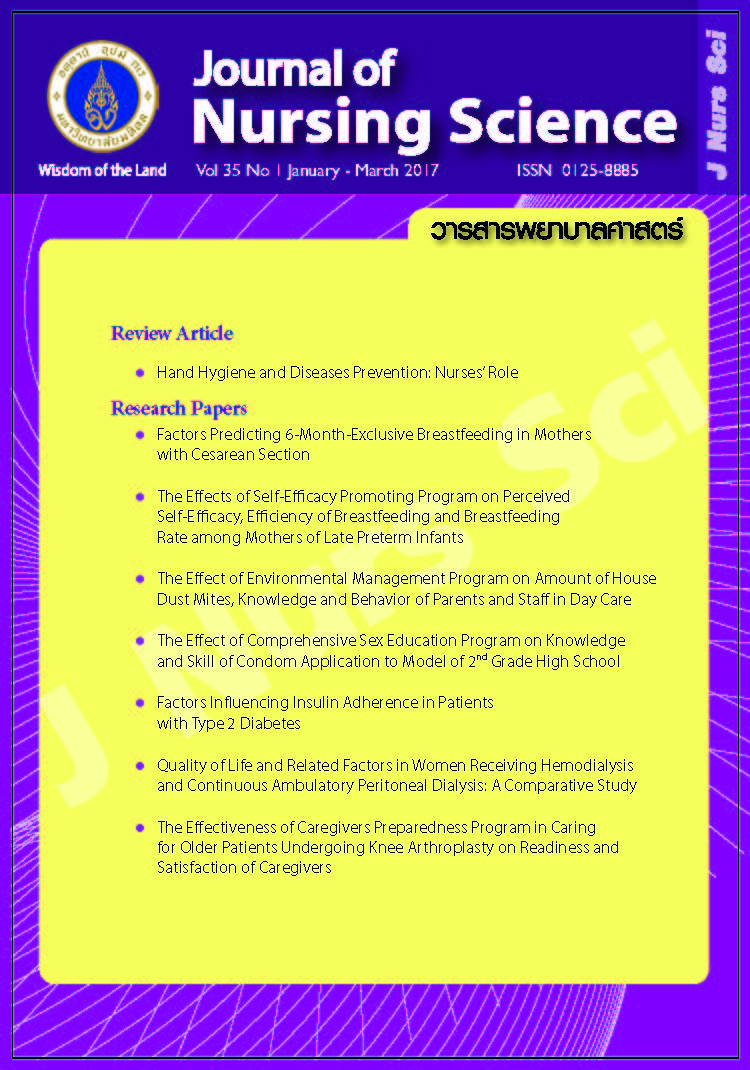The Effects of Self-Efficacy Promoting Program on Perceived Self-Efficacy, Efficiency of Breastfeeding and Breastfeeding Rate among Mothers of Late Preterm Infants
Main Article Content
Abstract
Abstract
Purpose: To study the effects of self-efficacy promotion program on perceived self-efficacy, efficiency of breastfeeding, and rate of excusive breastfeeding in mothers of late preterm infants.
Design: Quasi-experimental research.
Methods: The sample consisted of normal delivery; single-birth mothers of late preterm infants. Neither the mothers nor the infants had breastfeeding barriers. The convenience sample was divided into two groups of 25 subjects each. The experimental group received breastfeeding knowledge through demonstrations and returns demonstrations for breastfeeding, breast milk expression and cup feeding using hands-off technique. Data were collected by using the perceived self-efficacy questionnaire, efficiency of breastfeeding evaluation form, and breastfeeding questionnaire. Data were analyzed using Independent t-test, Mann-Whitney U Test, and Chi-Square statistics.
Main findings: The study findings revealed the mothers in the experimental group had higher efficiency of breastfeeding than the control group with statistical significance (p < .05). On the other hand, perceived self-efficacy in breastfeeding before discharge from the hospital and 8 weeks postpartum and breastfeeding rates were not different with statistical significance (p > .05).
Conclusion and recommendations: Nurses and related health personnel could apply this program to promote efficiency of breastfeeding in mothers of late preterm infants.
ผลของโปรแกรมส่งเสริมการรับรู้สมรรถนะแห่งตนต่อการรับรู้ สมรรถนะตนเอง ประสิทธิภาพการให้นมทารก และอัตราการเลี้ยงลูกด้วยนมแม่อย่างเดียวของมารดาทารกเกิดก่อนกำหนดระยะท้าย
บทคัดย่อ
วัตถุประสงค์: เพื่อศึกษาผลของโปรแกรมส่งเสริมการรับรู้สมรรถนะแห่งตนต่อการรับรู้สมรรถนะตนเองประสิทธิภาพการให้นมทารก และอัตราการเลี้ยงลูกด้วยนมแม่อย่างเดียวของมารดาทารกเกิดก่อนกำหนดระยะท้าย
รูปแบบการวิจัย: การวิจัยกึ่งทดลอง
วิธีดำเนินการวิจัย: กลุ่มตัวอย่างเป็นมารดาทารกเกิดก่อนกำหนดระยะท้านครรภ์เดี่ยวคลอดปกติ มารดาไมีมีข้อห้ามในการให้นมบุตรและทารกไม่มีอุปสรรคในการดูดนม กลุ่มตัวอย่างถูกเลือกแบบสะดวกแบ่งออกเป็น 2 กลุ่ม กลุ่มละ 25 ราย กลุ่มทดลองได้รับความรู้เกี่ยวกับการเลี้ยงลูกด้วยนมแม่ สอนสาธิตและสาธิตย้อนกลับวิธีการให้นมทารกการบีบเก็บน้ำนม และการป้อนนมด้วยแก้ว ด้วยวิธี hands off technique รวบรวมข้อมูล โดยใช้แบบสอบถามการรับรู้สมรรถนะตนเอง แบบประเมินประสิทธิภาพการให้นมทารก และแบบสอบถามการเลี้ยงลูกด้วยนมแม่ วิเคราะห์ข้อมูลด้วยสถิติทดสอบที สถิติ Mann-Whitney U test และสถิติไคสแควร์
ผลการวิจัย: มารดากลุ่มทดลองมีประสิทธิภาพในการให้นมทารกสูงกว่ากลุ่ม ควบคุมอย่างมีนัยสำคัญทางสถิติ (p < .05) แต่มีการรับรู้สมรรถนะตนเองในการเเลี้ยงลูกด้วยนมแม่ก่อนจำหน่ายทารกออกจากโรงพยาบาล และเมื่อ 8 สัปดาห์หลังคลอด และอัตราการเลี้ยงลูกด้วยนมแม่ไม่แตกต่างกัน (p > .05)
สรุปและข้อเสนอแนะ: พยาบาลและบุคลากรที่เกี่ยวข้องควรนำกิจกรรมของโปรแกรมส่งเสริมการรับรู้สมรรถนะแห่งตนสำหรับมารดาทารกแรกเกิดก่อนกำหนดระยะท้าย ไปประยุกต์ใช้ในการส่งเสริมให้มารดาทารกเกิดก่อนกำหนดระยะท้ายสามารถให้นมแม่ได้อย่างมีประสิทธิภาพ
คำสำคัญ: การเลี้ยงลูกด้วยนมแม่ ทารกเกิดก่อนกำหนดระยะท้าย การส่งเสริมสรรถนะแห่งตน
Article Details
Copyright Notice: Nursing Science Journal of Thailand has exclusive rights to publish and distribute the manuscript and all contents therein. Without the journal’s permission, the dissemination of the manuscript in another journal or online, and the reproduction of the manuscript for non-educational purpose are prohibited.

Disclaimer: The opinion expressed and figures provided in this journal, NSJT, are the sole responsibility of the authors. The editorial board bears no responsibility in this regard.


